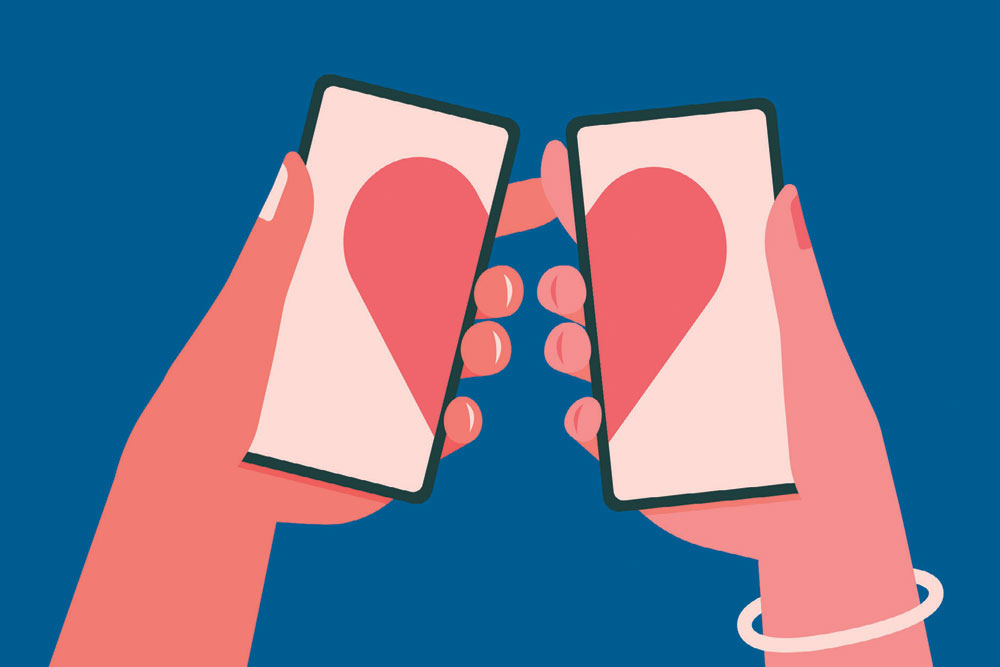Assisted Romance
Singles are upping their love quotient with simulated dates, spruced up profiles on dating apps and workshops with relationship coaches
 Lhendup G Bhutia
Lhendup G Bhutia
 Lhendup G Bhutia
Lhendup G Bhutia
 |
22 Dec, 2023
|
22 Dec, 2023
/wp-content/uploads/2023/12/Assistedromance1.jpg)
(Illustrations: Saurabh Singh)
IT WAS SOMETIME IN SEPTEMBER, WHILE SCROLLING through his profile on a dating app late one night that Dibesh had what he describes as an epiphany. “It just struck me,” the 34-year-old graphic designer from Kolkata, whose name was changed upon request, says. “It had been over five years since I had first joined Tinder. And I’ve joined so many apps since then. But I hadn’t had even one proper relationship.”
Dibesh uses multiple dating apps today, from Tinder, Hinge and Bumble to desi versions like TrulyMadly, and although the time he spends on these platforms has varied over the years, he estimates to have spent over an hour or two daily over the last couple of years. He still thinks he’s been luckier than many of his male friends since he has managed to go on a few dates. But these dates would invariably turn out awkward, and in quite a few that he felt had turned out well, the women would later ghost him.
Over the last few years, a kind of routine had set in. He would settle in his room after work in the evenings, the time just whizzing by, as he swiped profiles, made the first and oftentimes painful conversations with new connections, pursued previous conversations with older connections, and pushed for dates that would not materialise or turn out to be duds. “It felt like I had taken a second job if I’m being really honest,” he says.
The only reason that compelled him to keep at it was his fear that if he logged out, he might miss his shot at finding a partner. So, in the week after he had his epiphany, Dibesh decided to go cold turkey. He logged himself off all dating platforms to see what’s out there. “Maybe, there were better ways, I felt,” he says. “Instead of spending all this time on these platforms, if I began going out more often, there was a better chance I could meet someone interesting this way.”
It hasn’t helped. About three months since, he still hasn’t met anyone.
Dibesh’s isn’t the only case. It may appear there is a boom in dating in India right now, the idea of men and women in casual and serious romantic relationships before marriage losing much of the baggage and taboo they carried till a few decades ago both in urban and semi-urban areas, aided in no small measure by the proliferation of dating apps across languages and communities. But a large cohort is still being left behind, individuals who may not have the nous, either on online dating platforms or in real life, to pursue a romantic interest, or find the modern dating world far too complex.
Some of them are now taking steps to gain control. They are taking courses and workshops with a new breed of dating and relationship coaches; sprucing up their dating app profiles; getting professional photographers to take photos for these platforms; having their conversations analysed; going on simulated dates to build up confidence; accompanying dating coaches on field trips; learning new tricks and unlearning old hangups.
“A lot of cultural shift is taking place in India,” says Aili Seghetti, whose The Intimacy Curator in Mumbai offers a dating, relationship, and intimacy coaching service. “More women are working, becoming independent. But many young men still come from traditional families, with their fathers as the only earning members. So, there is a disconnect with the women they meet now. Also, because there is so much of competition in India, right from school to even at the workplace, emotional relationships like dating are seen as a waste of time. Many grow up without ever properly interacting with those of the opposite gender. So now that they land up in an office and see women they are interested in, they don’t even know how to speak with them.”
It may appear there is a boom in dating in India right now. But a large cohort is still being left behind, individuals who may not have the nous, either on online dating platforms or in real life, to pursue a romantic interest, or find the modern dating world far too complex
Seghetti, who moved from the UK to India several years ago, initially worked in market research and brand strategy. Some of her clients included dating apps that were launching in India, and as she began to speak with consumers for market research, she felt the need for a service that could help individuals in their relationship needs. She offers courses today that can range from a few sessions to one that stretches across three months, depending on the problems an individual is experiencing. “It depends on what stage a person is stuck in. Maybe, someone is not getting any swipes. Then we look at his dating profile, and look at what he isn’t articulating well. We make him more relatable, advise what photos to put, sometimes even select them, and tell them what to write on their profile. Or, maybe, this person is getting swipes, but he isn’t able to take conversations forward. In which case, we analyse his conversations and teach him how to communicate. Or, maybe, they are going out on dates, but getting ghosted thereafter. Or, maybe, they aren’t able to take it to the physical level. Maybe, it is just wanting to kiss or be intimate. We teach and train them about touch, and how to express desire. We also talk to them about consent, and how to seek it while still making it sexy,” she says.
Interestingly, Seghetti also helps her clients by offering a dating surrogate, where either she, or one of the professionals working with her, goes out on simulated dates with individuals, to give feedback and improve their dating skills. “Dating is a skill like cooking or cycling. Like everything else, you need practice to get better,” she says.
EARLIER THIS YEAR, A 25-YEAR-OLD IT PROFESSIONAL BASED in Bengaluru reached out to Seghetti to help him attract a female colleague. “He had studied in predominantly male institutes, never had a girlfriend or even spoken to women properly before. And now he was at his first job, and liked a girl working there, but he didn’t know how he could approach her,” Seghetti says. She walked him through his fears, suggested he organise a dinner at home for his friends, including his love interest, and strategised how he could approach her. “I told him to take his time, become friends, and keep his options open. But a few months later, he told me they were seeing each other,” she says.
A few months back, Radhika Mohta, a popular relationship coach and matchmaker in Bengaluru who runs a dating accelerator programme called Elevate for marriage-minded singles, began helping out a woman in her early- 30s from Amritsar. The woman had listed meditation, yoga, and mindful living as her interests, and Mohta recommended she log out of dating apps she was registered on, and join The Art of Living Matrimony, which pitches itself as an app for spiritually-minded individuals. “I told her to do away with those [apps] which aren’t working and be on the ones which are more relevant and specific for you,” she says. Since the woman had told Mohta that she had been on multiple first dates which never progressed into a second, Mohta began to give her tips on what she could do on first dates so it could progress further. “She listened to me for a full 60 seconds and then said, ‘But Radhika, I’m the one who is not taking them to a second.’ I was like, ‘What, wait, what’s happening?” Mohta says. “This woman had been on first dates with 10 to 12 men in the last two months.”

According to Mohta, one of the big reasons for people experiencing difficulties in securing dates is that they do not have realistic expectations. The proliferation of dating apps has become something of a double-edged sword. While many find partners on dating platforms, she says, several just get trapped on these platforms. “I see lots of people who are just seeking more validation and more ego boost on apps, and they constantly find themselves in that texting trap, and they complain about people not being nice [on these platforms or when they go out on dates],” she says. Many of them also find themselves caught in what Mohta calls the texting trap, in which individuals find themselves unable to convert chats with connections on dating apps into a date. “I keep telling them [her clients], that texting is not dating,” she says.
Many people struggle on dating platforms, Mohta says, because they get it all wrong. “Your pictures are like a marketing billboard,” she says. “It is not just about physical appearances. If everything is just yet another selfie and yet another good-looking shot [of yourself]. I’m like, ‘OK, but what’s your vibe? Your personality? Can I see what you’re interested in? Can I know if you do something beyond taking selfies in the gym… [Also] I’ve seen those conversation starters which are like one-word answers. And I’m like this is not your exam. Nobody wants those one-word answers from you… Give me a story. Tell me, what is it that you’re looking for in your ideal partner? Or tell me, what are you looking forward to on a Sunday date? Give me your vibe,” she says.
Some individuals are taking courses and workshops with a new breed of dating and relationship coaches; sprucing up their dating app profiles; learning new tricks and unlearning old hangups
The awkwardness in seeking love is of course age-old. People have been wondering if someone loved him or her back even before the first time someone came up with the idea of interrogating a flower for it. But, according to Pratik Jain, a popular dating coach in Mumbai, dating has become far more complex in recent times. “Firstly, dating apps have made things more complicated. And then there is a lot of anxiety over what is appropriate or not, or what is accepted or what is creepy today,” he says. Seghetti describes a kind of cluelessness that has crept in. “They don’t know if they [men] should pay for a date or not. Should they compliment her on her looks? Should they hold the door open?… How to express desire or interest without coming across as creepy?” she says.
Jain, who focuses entirely on men and travels to various cities every month to conduct his courses on the field, at events and parties, where he helps his clients become more comfortable in such situations, isn’t a big fan of dating apps. As a coach, he rues about what he calls the lost art of non-verbal communication when seeking out partners among strangers. Besides, he points out that because a disproportionately larger number of men log on to these platforms compared with women, the chances of finding partners come down. “On dating apps, I tell people to put more effort on their profiles, and hire a nice photographer to shoot pictures. Also, I tell them, you have to remain logged in long. You have to win the [platform’s] algorithm, before you win a girl,” he says.
To Seghetti, the biggest problem ailing the dating scene in India is the growing disconnect between single men and women. Many men, she says, because of the way they are raised, tend to be emotionally immature, while women are becoming increasingly more financially independent and unwilling to be in subservient relationships. Recently, noticing a new demand, Seghetti launched what she calls the rent-a-boyfriend service. Here, a man vetted by Seghetti’s intimacy curator is made available as a boyfriend for a designated number of hours for a fee. The arrangement is strictly professional, and without any chance of leading to a real romantic relationship, Seghetti says, and because he is vetted, the safety of the woman hiring him is assured. “You can take him to an event, maybe a wedding. You can introduce him as your boyfriend, take photos with him,” Seghetti says. These are for women, Seghetti explains, who have grown tired of the dating scene, and want to remove themselves entirely from it. “We have just started it. And it’s available only for our clients in the metro cities,” Seghetti says. “It is just a small group of women who want this right now. They asked for it because they don’t want 50 calls after a single date, or have someone jump on them because they agreed to meet them,” she says.
The majority, of course, both men and women, are still looking for relationships. So, what is the best advice a coach can offer a client? “Dating is a marketplace today,” Seghetti says. “Conventional good looks help, sure. But that’s not enough. You have to be able to express who you are.”

/wp-content/uploads/2025/04/ToC-Cover-Pahalgam.jpg)












More Columns
Centre warns media against TRP-driven coverage that endangers troops Open
Stitched in Silence: India’s Secret in Every Luxury Closet Immpana Srri
Was Shakespeare an Errant Husband? Nandini Nair